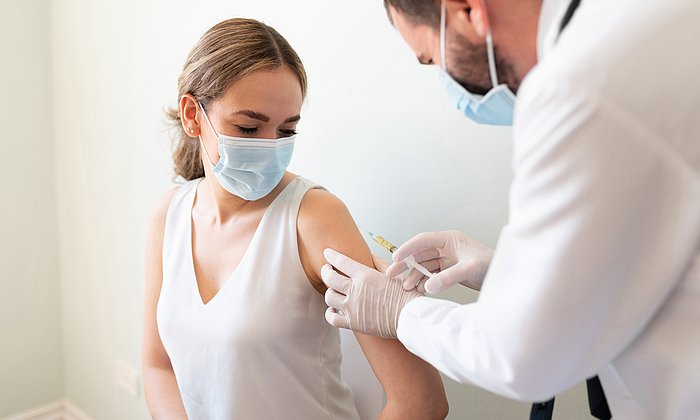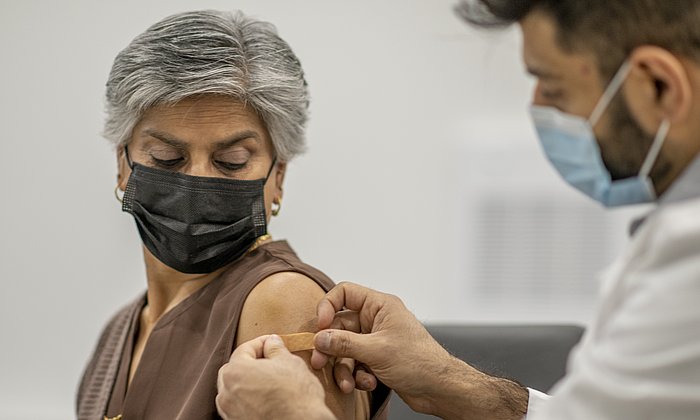Teaching and Quality Management
Combining excellent research with excellent teaching – that is the aspiration of TUM. Teaching at our university is carried out according to the highest didactic and technical standards, oriented towards learning objectives and competency.
![Teaching and Quality Management [Translate to English:]](/fileadmin/_processed_/0/e/csm_20221014_Bild_Lehre_AE_KB_046_3675e4c03e.jpg)
Teaching Methods
Here you will find an overview of the didactic principles on which teaching at TUM is based, as well as assistance in designing courses and examinations.
Awards and Competitions
At TUM, there are a variety of forums and competitions for innovative teaching formats, outstanding didactic concepts and the exchange on the latest developments.
Dialogue on Teaching
At TUM, there are a number of regular events on the culture of teaching and learning that provide impetus for lecturing and space for discussion and exchange.
Quality Management
The goal of quality management is to design, establish and further develop attractive, challenging and internationally competitive degree programs.
Training for Teaching
Whether didactics, e-learning or evaluation – TUM offers a wide range of consulting and training services on all topics related to studying and teaching.
Internationalization Language Services
The Internationalization Language Services coordinates translations into English as well as (copy) editing, and provides the dict.tum terminology database.
ProLehre | Media and Didactics
Barer Str. 19
80333 München
Handouts, guides, and templates: documents on teaching and QM.
News: Teaching and Learning
Study demonstrates barriers for communications on Covid-19
Vaccination campaign messages often prove ineffective

Not many Covid-19 vaccination campaigns in Europe lived up to the hopes of the public health authorities. However, the results of past studies in various countries have yielded a mixed picture as to which communication strategies can increase vaccine uptake and which factors undermine certain messages. A team of the Technical University of Munich (TUM), the University of Trento and the London School of Economics and Political Science explored these questions in Bulgaria, France, Germany, Italy, Poland, Spain, Sweden and the UK.
During the intensive phase of the vaccination campaigns, in June 2021 (in April in Germany), more than 10,000 unvaccinated adults were initially provided online with general information on the available vaccines. Then they received one of three messages combining text and images or were assigned to a control group. Message 1 highlighted the efficacy of the available vaccines in reducing the risk of serious illness and death through Covid-19. Message 2 stressed the advantages of having a vaccination certificate, especially for travel. Message 3 presented the prospect of leisure-time activities without restrictions, for example restaurant and cinema visits, access to fitness studios and attendance at concerts. The participants were then asked whether they intended to be vaccinated against Covid-19 if given the opportunity during the following week.
Three messages effective only in Germany
The study, published in Science Advances, shows that the tested messages would be effective in boosting vaccination quotas only in Germany and, to a lesser extent, in the UK. In Germany the vaccination willingness was significantly higher in the three groups than in the control group. In the UK, the readiness was higher only when the message stressed the benefits of a vaccination certificate. In all other countries the messages were ineffective – or even produced results opposite to those intended: people in Spain and Italy, when informed of the reduced risk of illness through vaccines, were less likely to seek vaccination than the corresponding control groups.
Decisive factor: health literacy
Using data mining methods, the research team was able to carry out detailed analysis of various associations between the message effectiveness and sociodemographic characteristics as well as the following factors: citizens’ trust in their government, their literacy with regard to healthcare issues and the share of the population who believe in certain conspiracy theories. The scientists used existing surveys to obtain data on these factors (which are not to be seen as monocausal) for the various countries.
For all messages, the likelihood of achieving the desired effect was reduced in a country when the health literacy of the population was low. “This result surprised us,” says Matteo M. Galizzi, a professor of behavioural science at the London School of Economics and Political Science. “We had thought that understandable and clearly visualized information on Covid-19 would lead to an improved understanding of the disease among people with little prior knowledge and thus to a greater vaccination willingness.” In contrast, the study confirmed conjectures that citizens’ trust in their own government would have a positive effect on vaccination intention.
Older people less receptive
Where there was relatively high prevalence of conspiracy theories, neither the message on health benefits nor that on the prospect of future leisure-time options produced significant successes. “The analysis shows that this strong disinformation can also explain the negative impact of health information in Spain and Italy,” says Giuseppe A. Veltri, a professor in computational social science at the University of Trento.
The researchers saw differences between socio-economic groups. For example, men with low levels of educational attainment were more often convinced by the two messages highlighting advantages in everyday life and leisure time than men with the same profile in the control group. Among these men there was also a very pronounced effect in countries with a high level of trust in the government and low prevalence of conspiracy theories. Older people tended to be less receptive on the whole to all of the messages.
“Clearer differentiation in campaigns”
“During the pandemic, people often looked at other countries to see what was working better or worse. Our study showed that such comparisons have limited usefulness,” says Prof. Tim Büthe, Chair of International Relations at TUM. “A more promising approach is to investigate the existing conditions in every country and then adapt the policy measures and communication strategies accordingly. Policy makers can use our findings to inform messaging for upcoming Covid-19 booster campaigns.”
Janina Steinert, a professor of global health at TUM, who headed the study, says: “Messages encouraging people to get vaccinated should target the various groups more closely, both in terms of content and how they are communicated, for example via certain social media channels or with gender-based or age group-specific advertising. Where the public lacks trust in the government, individuals seen as role models by certain socio-economic groups can be chosen as communicators.”
However, if a communication campaign has poor prospects of success due to several known barriers, the research team recommends shifting the focus to other measures. These might include concrete incentives or individually assigned vaccination appointments, which can only be actively objected to. “In the long term, all countries should develop their citizens’ health literacy to improve the effectiveness of future vaccination campaigns,” says Steinert.
Further study shows the role of approval processes
Another study published online and currently going through the scientific review process provides indications of how trust in vaccines depends on their approval process. Researchers at TUM, the University of Innsbruck and the private university UMIT Tirol showed information on a hypothetical mRNA vaccine to a representative sample of around 2000 German adults at an early stage in the vaccination campaign, in March 2021. The participants were randomly presented with four different vaccine approval scenarios: emergency authorization lasting either five or 20 days or an accelerated but in-depth process lasting either 20 or 150 days. Afterwards they were asked whether they would be willing to get immunized with the vaccine, whether they trusted it and how much they would pay for it.
A comparison of the two groups presented with a 20-day approval process shows a significantly higher willingness to accept the vaccine and a greater level of trust after the in-depth process as compared with the emergency authorization (13 and 12 percentage points, respectively). This group was also willing to pay 8-9 euros more for the vaccine. A longer testing phase had a lower impact: In the comparison of the two groups presented with the emergency approval process, the extension of the examination period from five to 20 days led to a 5-6 percentage point increase in the stated willingness to be vaccinated and trust in the vaccine. The extension of the in-depth process from 20 to 150 days did not have a significant effect. “During a pandemic, the approval authorities have to balance the priorities of approving vaccines quickly while creating trust through thorough examination,” says study author Philipp Lergetporer, a professor of economics at TUM. “Our study can help to provide a basis for these difficult decisions.”
Steinert JI, Sternberg H, Prince H, Fasolo B, Galizzi M, Buethe T, Veltri GA (2022). COVID-19 Vaccine Hesitancy in Eight European Countries: Prevalence, Determinants and Heterogeneity. Science Advances Vol 8, Issue 17. DOI: 10.1126/sciadv.abm9825
Angerer S, Glätzle-Rützler D, Lergetporer P, Rittmannsberger T (2022). How Does the Vaccine Approval Procedure Affect Covid-19 Vaccination Intentions? SSRN (Working Paper). DOI: 10.2139/ssrn.4073498
- The study published in Science Advances is part of the project “PERISCOPE – Pan-European Response to the ImpactS of COVID-19 and future Pandemics and Epidemics”, which has received 10 million euros in EU funding. 32 partner institutions from 15 European countries are investigating the social, political and economic impacts of the pandemic.
- Research on the Covid-19 pandemic at TUM
Technical University of Munich
Corporate Communications Center
- Klaus Becker
- klaus.becker@tum.de
- presse@tum.de
- Teamwebsite
Contacts to this article:
Study „COVID-19 Vaccine Hesitancy in Eight European Countries”:
Prof. Dr. Janina Steinert
Technical University of Munich (TUM) / Hochschule für Politik München (HfP)
Professorship of Global Health
Tel.: +49 89 907793 321
janina.steinert@tum.de
Study “How Does the Vaccine Approval Procedure Affect Covid-19 Vaccination Intentions”:
Prof. Dr. Philipp Lergetporer
Technical University of Munich (TUM)
Professorship of Economics
Tel. +49 7131 2641 8856
philipp.lergetporer@tum.de



